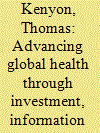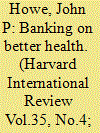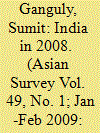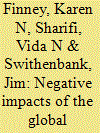|
|
|
Sort Order |
|
|
|
Items / Page
|
|
|
|
|
|
|
| Srl | Item |
| 1 |
ID:
132540


|
|
|
|
|
| Publication |
2014.
|
| Summary/Abstract |
The past decade has witnessed unprecedented levels of investment and engagement in global health spurred by the global HIV/AIDS crisis, the development of the Millennium Development Goals, momentum in polio eradication, and global outbreaks of infectious diseases such as SARS with its US$40 billion cost to society. Characterized by a sense of urgency, pragmatism, and opportunity, global health services and public health systems are being advanced to respond to rapidly expanding demands with dramatic results. However, much more remains to be done. After a decade in emergency mode, the next phase of global health work requires an even more precise approach and smarter investments. Many "donor" nations and organizations have tightened their belts in response to the recent economic downturn, while at the same time increasing the numbers of "recipient" countries, and are now better able to invest more of their own resources to benefit and protect their own citizens. In this climate, global health investments in programs and innovations must be better targeted and better informed by strategic information more than four-fold from US $6.7 billion in 1993 to US $28.4 billion in 2011. Accompanying this investment was a striking decline in mortality in children under five years of age from 12.6 million deaths in 1990 to 6.6 deaths million in 2012. Improvements in health are not the only positive outcome of these investments. The same Commission concluded that global health is a smart investment - for every dollar invested in health, it can be expected that there will be a 10-20 fold return in economic benefit to society. Healthier people are more productive and contribute back to the economy. Healthier people also lower health care costs, naturally, by requiring less care.
|
|
|
|
|
|
|
|
|
|
|
|
|
|
|
|
| 2 |
ID:
132541


|
|
|
|
|
| Publication |
2014.
|
| Summary/Abstract |
HIV is no longer a death sentence" - that hopeful declaration-which would have been unthinkable even a decade ago- has now become a cliché by repetition whenever experts, physicians, academics and journalists gather to chart progress in fighting the disease and to set goals for the future. But for many people, sadly, that statement is not actually true. There remains no cure for the disease, and not everyone can get access to the anti-retrovirals (ARVs) that have done so much to help so many. This reflects the painful truth that poverty remains a major impediment to good health in the developing and even the developed world.
|
|
|
|
|
|
|
|
|
|
|
|
|
|
|
|
| 3 |
ID:
086677


|
|
|
|
|
| Publication |
2009.
|
| Summary/Abstract |
The past year saw significant domestic turmoil in India. The country confronted a series of terrorist attacks including the one in Bombay, witnessed ethno-religious violence, dealt with a resurgent Maoist (Naxalite) guerilla movement, and faced agitations from agricultural communities over the acquisition of land for industrialization. On the external front, India managed to consummate a critical civilian nuclear agreement with the U.S., after much domestic debate and contention.
|
|
|
|
|
|
|
|
|
|
|
|
|
|
|
|
| 4 |
ID:
116942


|
|
|
|
|
| Publication |
2012.
|
| Summary/Abstract |
Over the years, a number of governmental policies have been developed in the UK that offer grants for the installation of distributed energy technologies or financial rewards per unit of electricity/heat generated from renewable and sustainable sources. The current economic climate however has meant that budget cuts have affected almost all government departments; consequently such policies have been adversely impacted. The alterations/modifications to many schemes have resulted in either a reduction in the funding available through these, changes to the eligibility of certain technologies or scales of generation or policy cancellations. The programmes affected include the Feed-In Tariff Scheme, Renewable Heat Incentive and Low Carbon Buildings Programme, among others. The adjustments for these are detailed herein, followed by the impacts these have had on the deployment rates of decentralised energy, especially microgeneration. Since costs are often one of the most significant factors constraining deployment of these technologies, reductions in funding opportunities have made these less financially-viable. Whilst there are still applications for funding under the available schemes, there has been considerably reduced levels of requests for financial support, thus future deployment rates will most likely be negatively affected. The prospects of these technologies in this context are then considered.
|
|
|
|
|
|
|
|
|
|
|
|
|
|
|
|
|
|
|
|
|